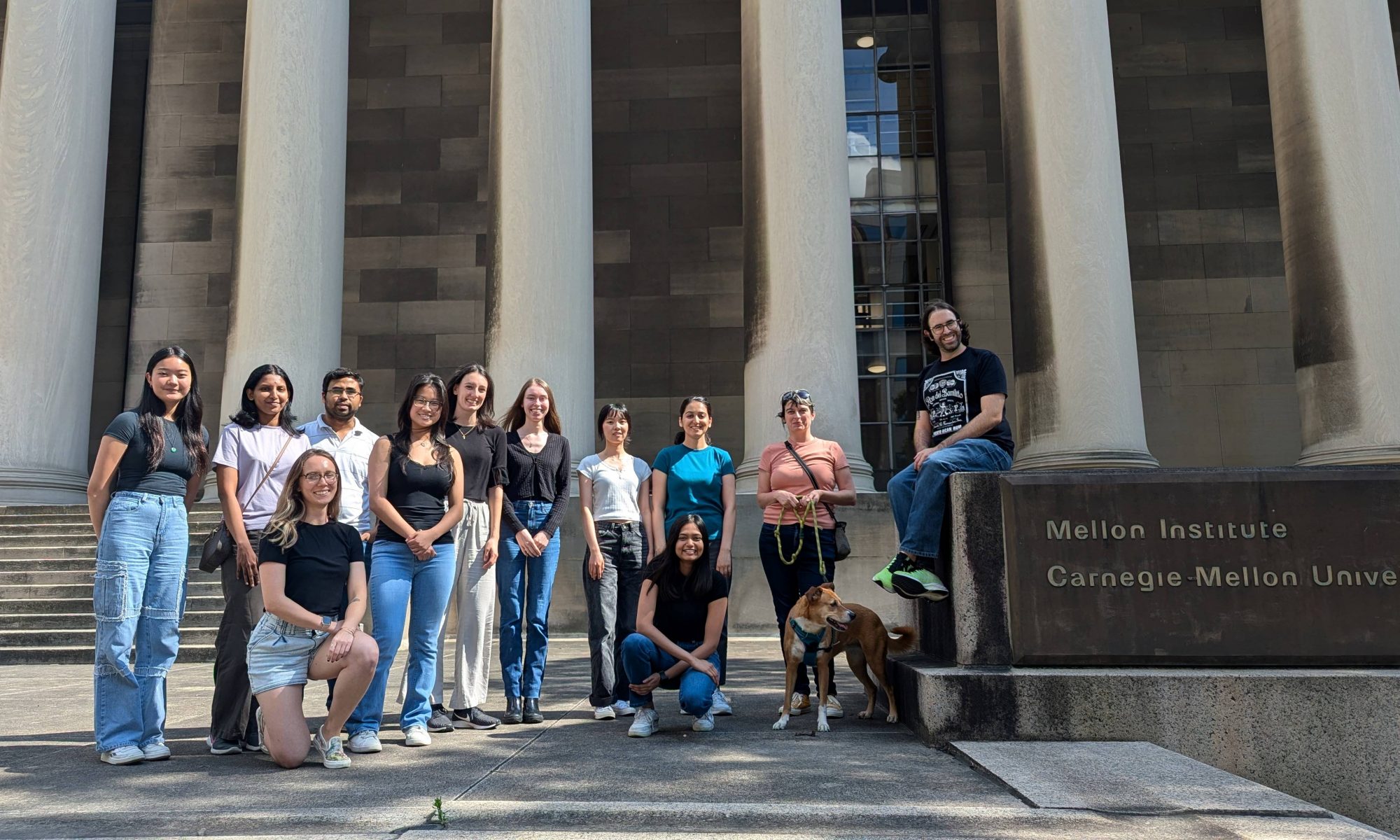
This poster came from Sammy Kata’s website. Visit to make your own!
Ph.D. Students
Hanna Wiandt
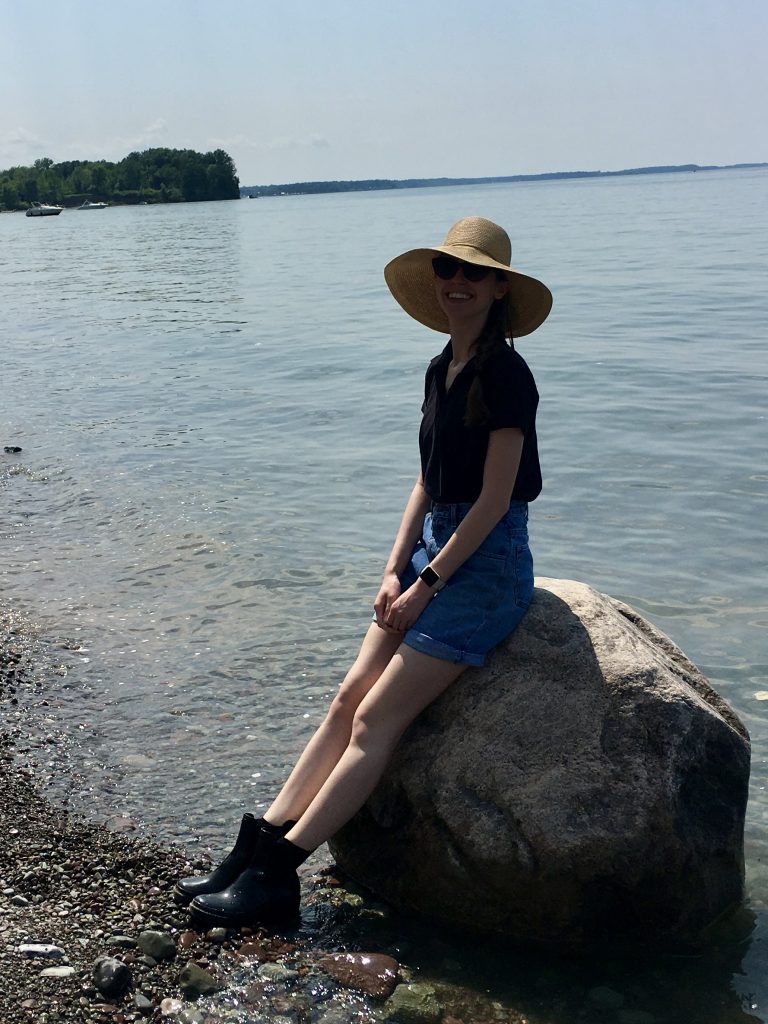 I am a new Ph.D. student in the Department of Chemistry at Carnegie Mellon University. As an undergraduate, I studied both chemistry and chemical biology, and my research focused on the effects of the environment on archaeological samples. I’m looking forward to transferring those lab skills to studying the effects of per/polyfluoroalkyl substances (PFAS) on the environment and biological systems. When I’m not in the lab, I enjoy horseback riding, reading, and hiking!
I am a new Ph.D. student in the Department of Chemistry at Carnegie Mellon University. As an undergraduate, I studied both chemistry and chemical biology, and my research focused on the effects of the environment on archaeological samples. I’m looking forward to transferring those lab skills to studying the effects of per/polyfluoroalkyl substances (PFAS) on the environment and biological systems. When I’m not in the lab, I enjoy horseback riding, reading, and hiking!
Natalie Colaizzo
 I am currently a first year Ph.D. student in the Chemistry Department at Carnegie Mellon University. I have a background in Environmental Science (Siena College, B.S.) and am interested in the fate of organic contaminants in the environment. I am particularly interested in the bioaccumulation of per/polyfluoroalkyl substances (PFASs) throughout aquatic food webs and aquatic ecosystems. Outside of the lab, I enjoy reading, embroidery and spending time outside!
I am currently a first year Ph.D. student in the Chemistry Department at Carnegie Mellon University. I have a background in Environmental Science (Siena College, B.S.) and am interested in the fate of organic contaminants in the environment. I am particularly interested in the bioaccumulation of per/polyfluoroalkyl substances (PFASs) throughout aquatic food webs and aquatic ecosystems. Outside of the lab, I enjoy reading, embroidery and spending time outside!
Kiran Ali
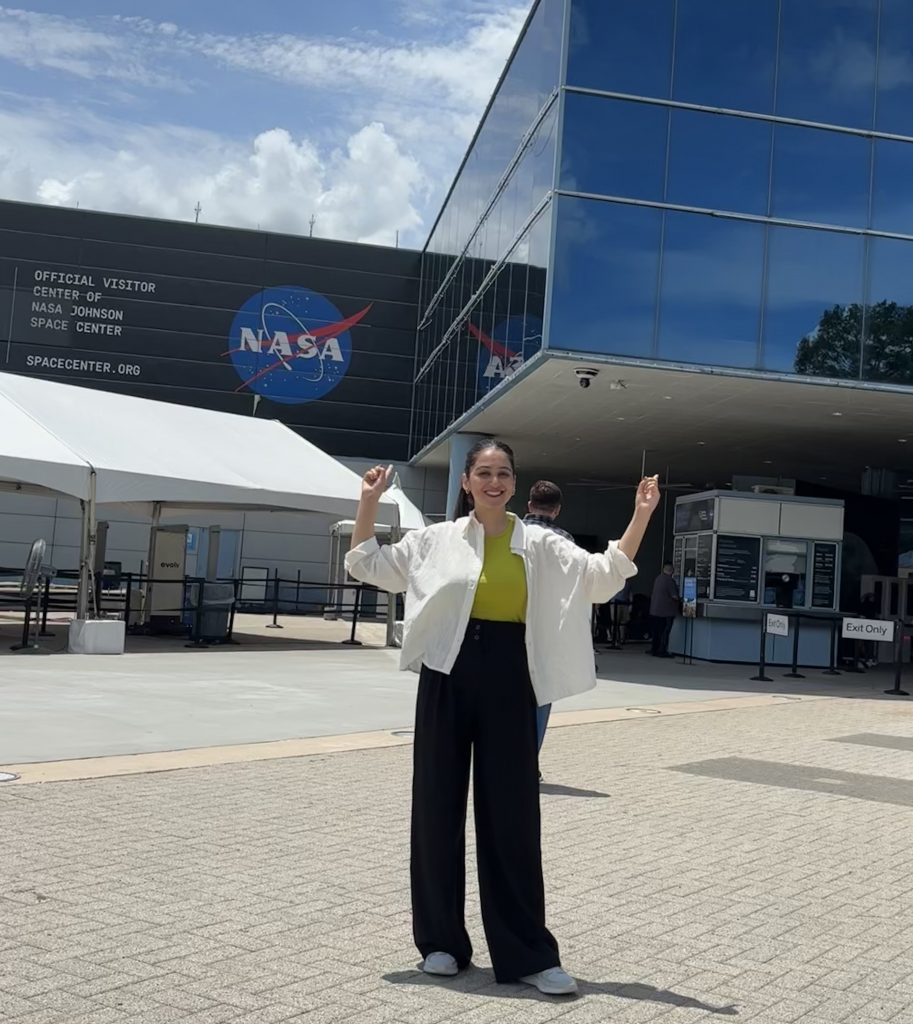 I am a rising second-year PhD student in the Department of Chemistry at Carnegie Mellon University. I earned my M. Phil degree from Hussain Ebrahim Jamal Research Institute of Chemistry at the University of Karachi, Pakistan. During my previous research, I focused on method development using HPLC-ELSD to rapidly screen secondary metabolites derived from plants.
I am a rising second-year PhD student in the Department of Chemistry at Carnegie Mellon University. I earned my M. Phil degree from Hussain Ebrahim Jamal Research Institute of Chemistry at the University of Karachi, Pakistan. During my previous research, I focused on method development using HPLC-ELSD to rapidly screen secondary metabolites derived from plants.
At CMU, my research is dedicated to understanding persistent chemicals particularly PFAS (per- and polyfluoroalkyl substances) in the environment, their exposure pathways and accumulation in organisms. Specifically, I am keen on developing remediation methods for these chemicals. Beyond academics, I have a passion for art.
Leenia Mukhopadhyay
 I am an environmental chemist from India, currently in the second year of my Ph.D. at Carnegie Mellon University. I am interested in the fate of organic pollutants in the environment and my work focuses on understanding per- and polyfluoroalkyl substances (PFAS) contamination trends in aquatic animals and environments. I am working on evaluating passive sampling strategies to measure the bioavailable fraction of PFAS in marine sediments. Outside of working in the lab, I enjoy badminton, hiking, and hanging out with my dog, Rocket!
I am an environmental chemist from India, currently in the second year of my Ph.D. at Carnegie Mellon University. I am interested in the fate of organic pollutants in the environment and my work focuses on understanding per- and polyfluoroalkyl substances (PFAS) contamination trends in aquatic animals and environments. I am working on evaluating passive sampling strategies to measure the bioavailable fraction of PFAS in marine sediments. Outside of working in the lab, I enjoy badminton, hiking, and hanging out with my dog, Rocket!
Undergraduate Researchers
 Morgan Van Der Linde
Morgan Van Der Linde
I am currently a 3rd year chemistry and engineering and public policy double major, working with Leenia in the lab. My work focuses on qualification and quantification of PFAS in Hudson River Fish samples by use of the time of flight quadrupole LC-MS. I am interested in the fate of organic molecules in the environment especially when related to human exposure. I love skateboarding, painting, and cuddling with my dog, Puck.
Robert Pures
Katherine Hon
Varrshitha Kumar
Postdoctoral Scientists
Dr. Yanan Chen
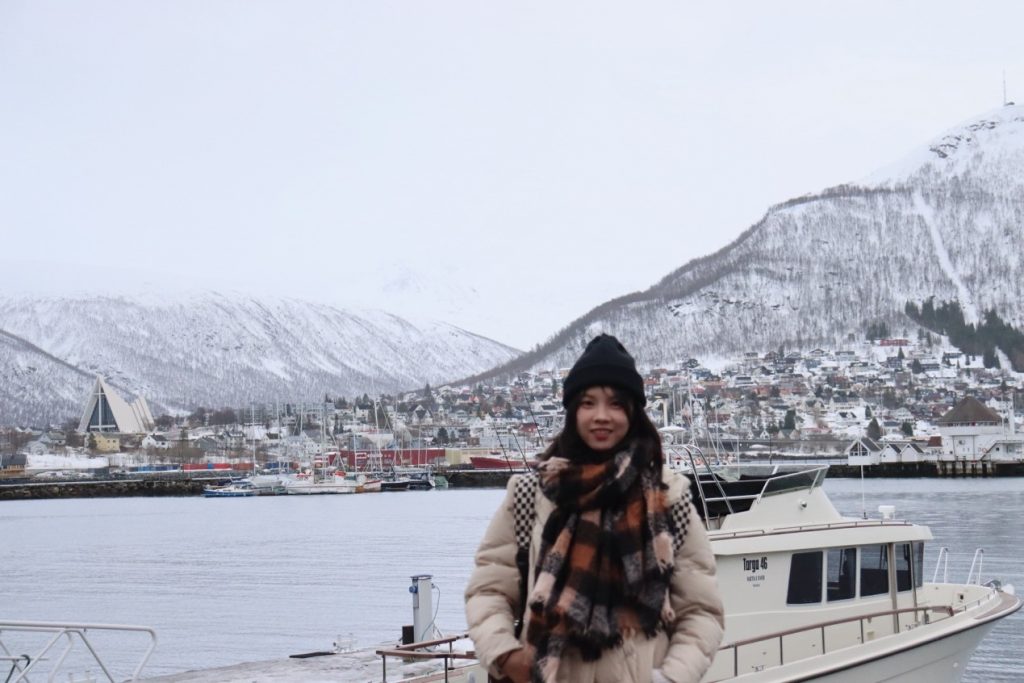 Yanan received her M.S. and Ph.D. degrees in Environmental Engineering from Fudan University, China. She also completed an 18-month joint-Ph.D. training program at Aalborg University, Denmark. Her research focuses on the environmental fate, risks, and degradation mechanisms of emerging environmental micropollutants, including DBPs, PPCPs, and microplastics.
Yanan received her M.S. and Ph.D. degrees in Environmental Engineering from Fudan University, China. She also completed an 18-month joint-Ph.D. training program at Aalborg University, Denmark. Her research focuses on the environmental fate, risks, and degradation mechanisms of emerging environmental micropollutants, including DBPs, PPCPs, and microplastics.
Yanan is skilled in analyzing trace organic residues in environmental matrices, with particular expertise in identifying and quantifying microplastics in various environmental samples such as water, wastewater, soil, and sediments. Currently, her postdoctoral research focuses on the exposure routes, bioaccumulation and toxicity of PFAS in marine organisms. Outside the lab, she enjoys traveling and reading.
Dr. Dilani Perera
 Dilani received her B.S. degree (with honors) in Chemistry from the University of Colombo, Sri Lanka in 2016, and her M.S. and Ph.D. degrees in Chemistry from the Florida International University in 2021 and 2022, respectively. She joined the McDonough lab in 2023 as a postdoctoral scientist.
Dilani received her B.S. degree (with honors) in Chemistry from the University of Colombo, Sri Lanka in 2016, and her M.S. and Ph.D. degrees in Chemistry from the Florida International University in 2021 and 2022, respectively. She joined the McDonough lab in 2023 as a postdoctoral scientist.
Dilani’s previous work focused on developing a novel method to remediate per- and poly-fluoroalkyl substances (PFASs) in biological systems. Her current work at the McDonough lab focuses on using high-resolution mass spectrometry for targeted and non-targeted screening of PFASs in biological matrices. She is also leading a project to develop an IM – LC/QTOF based method to differentiate PFAS isomers. Outside the lab, Dilani spends time with her two babies Sahansa and Vidvaan.
Dr. Raj Mukhopadhyay [Fulbright-Nehru Fellow]
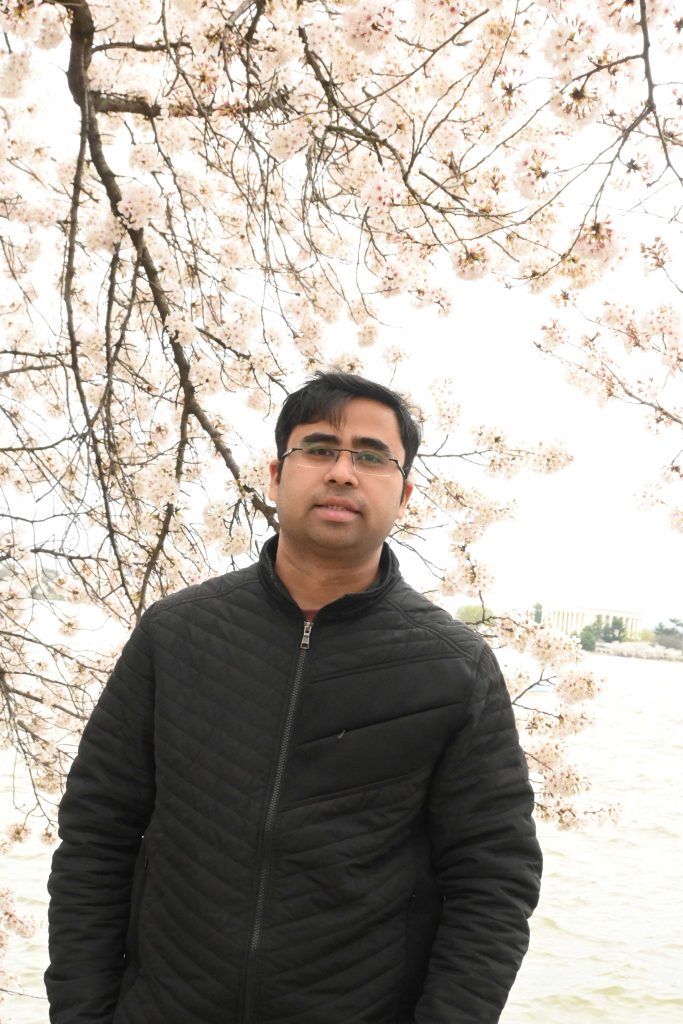 I am a Fulbright-Nehru Postdoctoral fellow working in the area of Environmental chemistry and engineering at the McDonough lab, Department of Chemistry, Carnegie Mellon University. I received PhD in Soil Science and Agricultural Chemistry from Indian Agricultural Research Institute, New Delhi, India (2018). Prior to joining McDonough lab, I was a Soil Scientist at Central Soil Salinity Research Institute, Karnal, India. Currently, my research works focus on development of engineered clay mineral adsorbents using naturally available clay minerals and biowastes to remove PFAS from contaminated water and reducing PFAS bioavailability in food crops, deciphering an inexpensive and green PFAS remediation method.
I am a Fulbright-Nehru Postdoctoral fellow working in the area of Environmental chemistry and engineering at the McDonough lab, Department of Chemistry, Carnegie Mellon University. I received PhD in Soil Science and Agricultural Chemistry from Indian Agricultural Research Institute, New Delhi, India (2018). Prior to joining McDonough lab, I was a Soil Scientist at Central Soil Salinity Research Institute, Karnal, India. Currently, my research works focus on development of engineered clay mineral adsorbents using naturally available clay minerals and biowastes to remove PFAS from contaminated water and reducing PFAS bioavailability in food crops, deciphering an inexpensive and green PFAS remediation method.
Group Lead
Dr. Carrie McDonough (she/her) – Associate Professor of Chemistry
 I am a chemical oceanographer and analytical chemist working at the intersection of environmental analytical chemistry, environmental health engineering, and toxicology. I received my B.Sc. in Chemistry from the Massachusetts Institute of Technology (MIT) in 2008, and my Ph.D. in Chemical Oceanography from the University of Rhode Island Graduate School of Oceanography (URI GSO) in 2017. I completed a postdoctoral fellowship at Colorado School of Mines developing methods for nontarget analysis of per/polyfluoroalkyl substances (PFASs) in biological samples. I use cutting-edge environmental monitoring and analytical chemistry techniques to study the fate, transport, and biological effects of anthropogenic organic contaminants in aquatic environments. Broadly, I am interested in how the molecular structure and chemical properties of pollutants influence their fate in the environment, as well as their biological effects in aquatic organisms and humans. My overarching objective is to understand human and ecosystem health risk associated with organic contaminants in water and to identify particular compounds of concern that should be prioritized for remediation and toxicological investigation. When I’m not working, I am usually brewing beer and hanging out with my dogs, Millie (pictured here) and Pickles.
I am a chemical oceanographer and analytical chemist working at the intersection of environmental analytical chemistry, environmental health engineering, and toxicology. I received my B.Sc. in Chemistry from the Massachusetts Institute of Technology (MIT) in 2008, and my Ph.D. in Chemical Oceanography from the University of Rhode Island Graduate School of Oceanography (URI GSO) in 2017. I completed a postdoctoral fellowship at Colorado School of Mines developing methods for nontarget analysis of per/polyfluoroalkyl substances (PFASs) in biological samples. I use cutting-edge environmental monitoring and analytical chemistry techniques to study the fate, transport, and biological effects of anthropogenic organic contaminants in aquatic environments. Broadly, I am interested in how the molecular structure and chemical properties of pollutants influence their fate in the environment, as well as their biological effects in aquatic organisms and humans. My overarching objective is to understand human and ecosystem health risk associated with organic contaminants in water and to identify particular compounds of concern that should be prioritized for remediation and toxicological investigation. When I’m not working, I am usually brewing beer and hanging out with my dogs, Millie (pictured here) and Pickles.
Alumni
David A. Dukes, Ph.D. 2024 (Current Position: Postdoctoral research fellow, Emory University Rollins School of Public Health, Atlanta, GA): Exploring the toxicokinetics of perfluoroalkyl acids and their precursors from an electrochemically fluorinated aqueous film-forming foam
Rachel Smolinski, Ph.D. 2024 (Current Position: ORISE postdoctoral research fellow, US EPA, Narragansett, RI): Trace organic contaminants in residential watewater and their fate in onsite wastewater treatment systems: A nontarget analysis approach to micropollutant identification
Jennifer Marciano, Thesis Master’s 2023 (Current Position: Chemist, Suffolk County Department of Health Services): Per/polyfluoroalkyl substances in northern Atlantic white shark (Carcharodon carcharias) plasma and muscle
Noor Hamdan, Project Master’s 2022 (Current Position: Ph.D. Student, Johns Hopkins University): Bioaccumulation of sediment-associated per/polyfluoroalkyl substances (PFASs) in marine polychaetes
Undergraduate Researcher Alumni
Alexis Zhao, Middlebury College (REU Summer 2024)
Natalie Colaizzo, B.S. Env. Sci., Siena College, Minor, Chemistry, (REU Summer 2023)
Fangyi Li, B.S. Chemical Engineering, Minor, Biological Sciences, 2024
